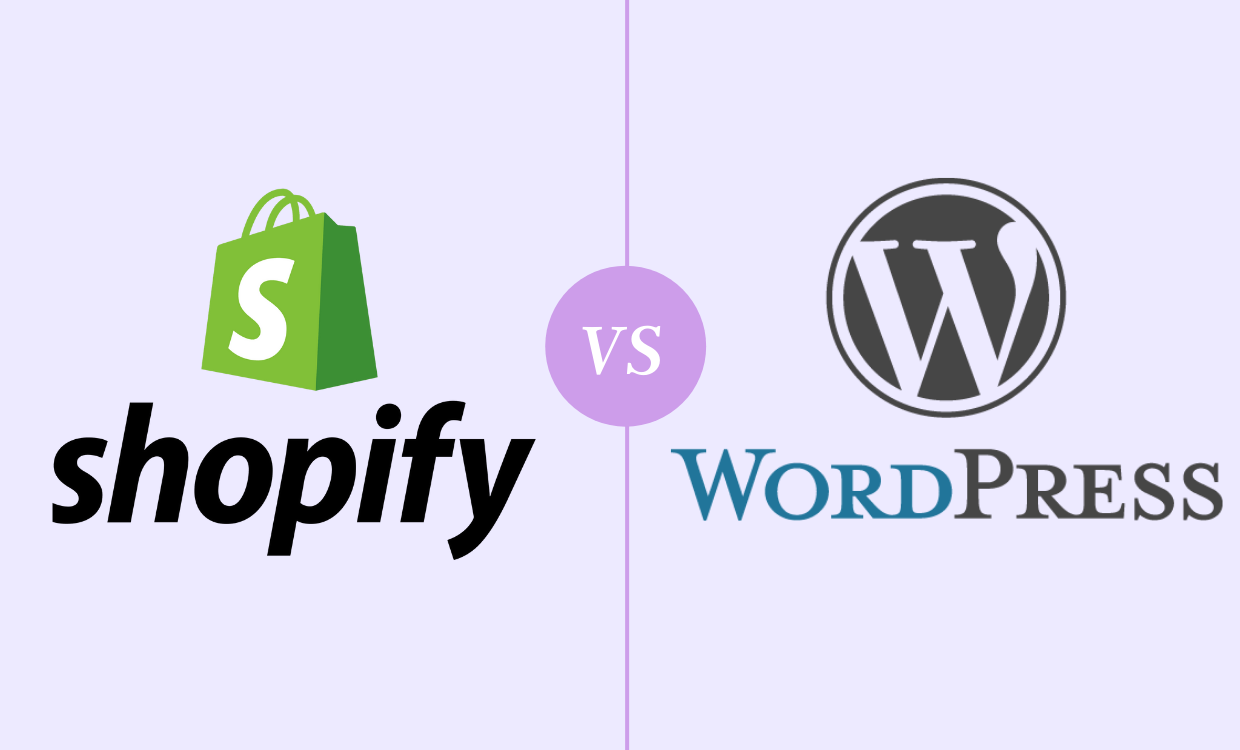Shopify & WordPress both are strong and renowned platforms. Shopify is basically designed for running and building e-commerce stores. While WordPress is an open-source platform that can be customized to meet any demands of the user including an e-commerce store.
If you are also trying to find out the best between both of them then this article is for you. Here is a list of some major factors that you should compare before commencing your e-commerce journey.

1. Pricing & Plans
Pricing & Plans differ for both platforms. It cannot be exactly compared as both hold different values in return.
Shopify has monthly and annual plans and without them, you cannot access the platform. Five major monthly plans of this e-commerce giant are listed here:
- Lite: $9 /month.
- Basic: $29/month.
- Shopify: $79 /month.
- Advanced: $299 /month.
- Plus: Around $2000/month (but negotiable)
WordPress is an open platform but people often confuse it for free. Building an online website here costs money. You need to invest in a number of things to build a durable and appealing website here.
Some of them are listed here:
- Hosting (monthly/annual plans)
- Template
- Plugins
- E-commerce integration
Building an e-commerce website on WordPress also requires skills and a freelance web developer can be of great use here.
2. Templates: Quantity & Quality
A good theme can help build better communication with your customers. Templates and themes always leave an impact on the audience and they should be convincing enough to turn the audience into potential customers.
Shopify offers classy and aesthetic templates designed by professionals. The themes are very responsive and easily customizable and include a number of 10 free themes and 71 premium ones.
If these templates are not enough for you, you can buy themes from third-party sources also. Install and customize these templates to perfection with the help of freelance Shopify developer.
The open-source platform offers unlimited themes and the variety can overwhelm a user. Few themes are free to use but you need to pay a price for the premium ones.
3. User experience
-
Ease of use
The basic layout of both platforms is quite similar and easy to use. Editing and publishing are easier on both platforms. But you can still take the help of online tutorials to get to know the features in detail.
-
Mobile-friendly
Shopify has more responsive themes and features on its e-commerce store. But not every WordPress theme is responsive on mobile phones. With a little effort, you can find a decent theme here.
-
User interface
Shopify has a very intriguing interface which makes website building and designing effortless.
4. E-commerce features
One major difference between them is their e-commerce features. Shopify is a complete dedicated platform for e-commerce businesses. All its features and services are aligned to match the needs of users.
WordPress free and paid platforms are not solely dedicated to the e-commerce business. It does not have in-built tools for its e-commerce platform. You can install plug-ins and third-party apps to work smoothly here.
5. Marketing tools & SEO
SEO is an important feature of every site as it increases the site’s ranking and visibility. Both WordPress and Shopify have strong tools for SEO. But the SEO tools of both platforms differ a little bit.
Shopify SEO tools focus on customers while WordPress is most suitable for blogs.
6. Blogging & Email marketing
Market blogging is often underrated but it is the best way to generate inbound leads. Good Blogs can generate views and create successful inbound marketing for your website.
WordPress is the strongest and world’s most popular tool for blogging. It also has blogging tools but WordPress easily outruns it.
Email marketing is also a crucial part of e-commerce marketing. Shopify has a dedicated feature for it, named ‘Shopify Email’. The best part of this Email is that you can send up to 2500 free emails from it.
WordPress does not have any dedicated in-built tool for email marketing. But you can connect a third-party app or plug-in to access this service.
7. Help & support
Comparing them on the basis of help & support is difficult because both of them have strong customer support teams but they have different audiences.
Shopify provides dedicated and excellent help and support to its users via chat, phone, and email. WordPress also has forums and blogs to answer all your queries.
8. Apps & Add-ons
WordPress has amazing plug-ins to convert your regular website into an e-commerce website. You can use Yoast for SEO, install plug-ins for email marketing. You can also use Google Analytics and Mailchimp to track the progress of your store.
In Shopify integrating plug-ins is not that easy. You will need help from a freelance Shopify developer to simplify your work.
FAQs
- Is WordPress different than Shopify?
Considering an e-commerce business, It is very different from Shopify. Shopify is solely dedicated to build and run e-commerce sites. While it is an open-source platform, it can still be used for running an e-commerce site with the help of plug-ins and apps.
- Is it good to use WordPress for e-commerce?
WordPress is effective as an e-commerce platform also but you may need help with extra plugins, and third-party apps.
Both are effective platforms but Shopify is better suited for e-commerce websites. In addition to that, WordPress is more customizable. You can make changes to your website without any technical support while in Shopify a developer is required.
Meta: Shopify vs WordPress both are good for an e-commerce website. But if you compare both of them Shopify has numerous advantages over WordPress.